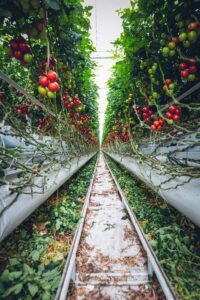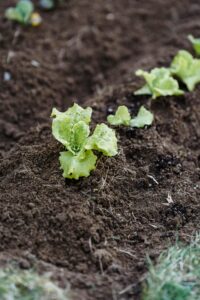Introduction: Organic farming has gained significant popularity in recent years as concerns about the environment and the quality of food have increased. This method of farming focuses on sustainable practices that prioritize soil health, biodiversity, and the use of natural resources. In this blog, we will explore the advantages and disadvantages of organic farming, as well as the principles that guide this agricultural approach towards a more sustainable future.
Advantages of Organic Farming:

-
Healthier Food: One of the primary advantages of organic farming is the production of healthier and safer food. Organic practices prohibit the use of synthetic pesticides, genetically modified organisms (GMOs), and artificial fertilizers. As a result, organic food is free from harmful residues, making it a healthier choice for consumers.

-
Environmental Conservation: Organic farming employs techniques that minimize environmental impact. By avoiding the use of chemical pesticides and fertilizers, organic farmers protect soil quality and prevent water pollution. Additionally, organic farms promote biodiversity by providing habitats for various beneficial insects, birds, and other wildlife.

-
Improved Soil Fertility: Organic farming relies on natural methods to enhance soil fertility and structure. Practices such as crop rotation, composting, and the use of organic matter help maintain soil health and increase its ability to hold water and nutrients. This, in turn, leads to better plant growth and yields.

-
Long-Term Sustainability: Organic farming focuses on long-term sustainability by promoting practices that conserve natural resources. By avoiding the use of synthetic chemicals, organic farmers reduce dependence on non-renewable resources. Furthermore, the emphasis on crop rotation and diversification helps prevent soil erosion and depletion.
Disadvantages of Organic Farming:

-
Lower Yields: Organic farming often results in lower crop yields compared to conventional farming methods. This is primarily due to the absence of synthetic pesticides and fertilizers, which can limit the ability to control pests and provide optimal nutrient levels. However, ongoing research and innovation in organic farming techniques aim to overcome this disadvantage.

-
Higher Labor Costs: Organic farming requires more labor-intensive practices, such as manual weed control and pest management. These additional efforts contribute to higher labor costs for farmers. However, some argue that this also creates job opportunities and strengthens local economies.
-
Certification Challenges: Obtaining organic certification can be a complex and costly process for farmers. Compliance with strict organic standards, record-keeping, and regular inspections can pose challenges, especially for small-scale farmers. However, certification provides assurance to consumers and helps maintain the integrity of organic products.

Principles of Organic Farming:
-
Soil Health: Organic farming prioritizes the maintenance and improvement of soil health. Practices that enhance soil fertility, such as crop rotation, composting, and the use of organic matter, are essential principles of organic farming.
-
Biodiversity: Organic farming encourages the preservation and promotion of biodiversity. By providing habitats for beneficial insects, birds, and other wildlife, organic farms contribute to a balanced ecosystem and reduce the need for chemical inputs.
-
Prohibition of Synthetic Inputs: The use of synthetic pesticides, fertilizers, and GMOs is strictly prohibited in organic farming. Instead, organic farmers rely on natural methods and inputs to maintain plant health and soil fertility.
-
Sustainable Resource Management: Organic farming emphasizes the responsible use of natural resources. This includes water conservation, energy efficiency, and the reduction of waste and pollution.
Conclusion: While organic farming offers numerous advantages such as healthier food, environmental conservation, improved soil fertility, and long-term sustainability, it also presents challenges in terms of lower yields, higher labor costs, and certification requirements. By adhering to the principles of soil health, biodiversity, prohibition of synthetic inputs, and sustainable resource management, organic farming continues to pave the way for a more sustainable and resilient agricultural future.
Natural Fertilizer for Plant for Sustainable Agriculture
https://finowaste.com/product/organic-mustard-seed-cake-fertilizer/
